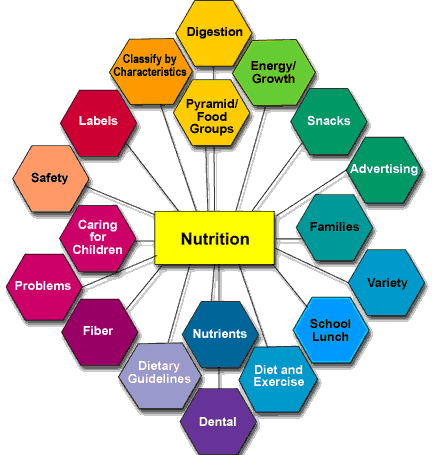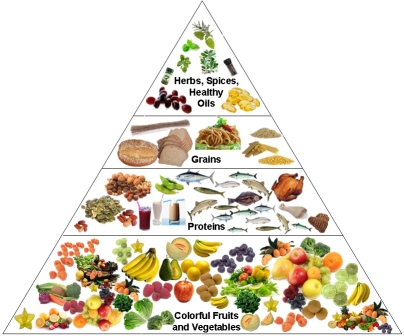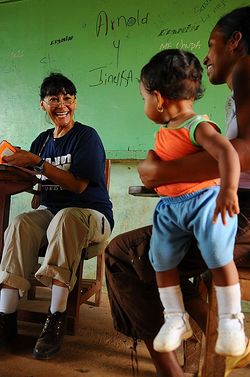Nutrition: Difference between revisions
No edit summary |
No edit summary |
||
| Line 31: | Line 31: | ||
== Physiotherapist's Role in Providing Specific Nutritional or Dietary Advice == | == Physiotherapist's Role in Providing Specific Nutritional or Dietary Advice == | ||
[[File:Prescribing.jpg|border|right|377x377px]] | [[File:Prescribing.jpg|border|right|377x377px]] | ||
* Patient's diet has an effect on [[Muscle Biomechanics|muscle function]] and muscle function is one of the key concerns in physical therapy practice.<ref>Phadke CP. [https://www.ncbi.nlm.nih.gov/pmc/articles/PMC5435402/ Why Should Physical Therapists Care about Their Patients' Diet?].</ref> Physiotherapists have the scope of knowing the patient's nutritional status which creates an opportunity to refer a patient to nutritionists when needed.<ref>Morris DM, Kitchin EM, Clark DE. [https://www.tandfonline.com/doi/abs/10.1080/09593980902835369 Strategies for optimizing nutrition and weight reduction in physical therapy practice: The evidence]. Physiotherapy Theory and Practice. 2009 Jan 1;25(5-6):408-23.</ref> | * Patient's diet has an effect on [[Muscle Biomechanics|muscle function]] and muscle function is one of the key concerns in physical therapy practice.<ref>Phadke CP. [https://www.ncbi.nlm.nih.gov/pmc/articles/PMC5435402/ Why Should Physical Therapists Care about Their Patients' Diet?] Physiother Can. 2017. p99-103.</ref> Physiotherapists have the scope of knowing the patient's nutritional status which creates an opportunity to refer a patient to nutritionists when needed.<ref>Morris DM, Kitchin EM, Clark DE. [https://www.tandfonline.com/doi/abs/10.1080/09593980902835369 Strategies for optimizing nutrition and weight reduction in physical therapy practice: The evidence]. Physiotherapy Theory and Practice. 2009 Jan 1;25(5-6):408-23.</ref> | ||
* A study over patients who underwent [[Bone Marrow|bone marrow]] transplant showed, despite proper nutrition, loss of [[muscle]] protein to be associated with inactivity, which indicates an association between physical therapy and nutrition.<ref>Cunningham BA, Morris G, Cheney CL, Buergel N, Aker SN, Lenssen P. [https://onlinelibrary.wiley.com/doi/abs/10.1177/0148607186010006558 Effects of resistive exercise on skeletal muscle in marrow transplant recipients receiving total parenteral nutrition]. Journal of parenteral and enteral nutrition. 1986 Nov;10(6):558-63.</ref> Another study suggests multidimensional interventions including nutrition and physical training to be effective in reducing [[Introduction to Frailty|frailty]] in [[Older People - An Introduction|geriatric people]].<ref>Veninšek G, Gabrovec B. [https://www.ncbi.nlm.nih.gov/pmc/articles/PMC5894465/ Management of frailty at individual level–clinical management: Systematic literature review]. Slovenian Journal of Public Health. 2018 Apr 12;57(2):106-15.</ref> | * A study over patients who underwent [[Bone Marrow|bone marrow]] transplant showed, despite proper nutrition, loss of [[muscle]] protein to be associated with inactivity, which indicates an association between physical therapy and nutrition.<ref>Cunningham BA, Morris G, Cheney CL, Buergel N, Aker SN, Lenssen P. [https://onlinelibrary.wiley.com/doi/abs/10.1177/0148607186010006558 Effects of resistive exercise on skeletal muscle in marrow transplant recipients receiving total parenteral nutrition]. Journal of parenteral and enteral nutrition. 1986 Nov;10(6):558-63.</ref> Another study suggests multidimensional interventions including nutrition and physical training to be effective in reducing [[Introduction to Frailty|frailty]] in [[Older People - An Introduction|geriatric people]].<ref>Veninšek G, Gabrovec B. [https://www.ncbi.nlm.nih.gov/pmc/articles/PMC5894465/ Management of frailty at individual level–clinical management: Systematic literature review]. Slovenian Journal of Public Health. 2018 Apr 12;57(2):106-15.</ref> | ||
Revision as of 04:39, 27 September 2020
Definition[edit | edit source]
According to the World Health Organization, "Nutrition is the intake of food considered in relation to the body’s dietary needs. Good nutrition – an adequate, well-balanced diet combined with regular physical activity – is a cornerstone of good health. Poor nutrition can lead to reduced immunity, increased susceptibility to disease, impaired physical and mental development and reduced productivity."[1]
Nutrition and Physiotherapy[edit | edit source]
According to APTA, "It is within the professional scope of physical therapist practice to screen for and provide information on diet and nutritional issues to patients, clients, and the community."[2]
The principles of physiotherapy are based on movement sciences and aim to restore the function of multiple body systems[3]. Physical therapists/ Physiotherapists are committed to improve and promote wellness[4], general health, lifestyle and quality of life. In some cases, it is also their role to reverse and manage lifestyle-related conditions with non-pharmacological interventions. They are well-positioned as established healthcare practitioners, to provide clinically relevant patient education with long-term health benefits as well as lifestyle behaviour changes to improve their general health and physical therapy outcomes.[5]
Unhealthy lifestyle behaviors are primary contributors to the prevalence of lifestyle-related conditions. To manage a patient as a whole with a holistic approach makes it essential for physiotherapists to have the basic knowledge about the role of nutrition in these lifestyle conditions, as well as understand the effects of a successful behaviour change.
Lifestyle behaviors include:
- Tobacco use/ smoking
- Sedentary lifestyles (inactivity)
- Poor nutritional intake
- Elevated stress
- Sub-optimal sleep
- Obesity
Preventable lifestyle conditions include:
- Ischemic heart disease
- Hypertension
- Stroke
- Type-2 Diabetes Mellitus
- Cancer (some cases)
- Emphysema
Physiotherapist's Role in Providing Specific Nutritional or Dietary Advice[edit | edit source]
- Patient's diet has an effect on muscle function and muscle function is one of the key concerns in physical therapy practice.[6] Physiotherapists have the scope of knowing the patient's nutritional status which creates an opportunity to refer a patient to nutritionists when needed.[7]
- A study over patients who underwent bone marrow transplant showed, despite proper nutrition, loss of muscle protein to be associated with inactivity, which indicates an association between physical therapy and nutrition.[8] Another study suggests multidimensional interventions including nutrition and physical training to be effective in reducing frailty in geriatric people.[9]
- Physical therapists/ Physiotherapists without the necessary nutrition-related education are not allowed to give dietary advice, but play a vital role in the screening and referring of patients that are in need of dietary advice or who can benefit from it. Many conditions managed and seen by physiotherapists are directly affected by diet and nutrition.
Related Pages and Documentaries[edit | edit source]
- Sports Nutrition
- Vitamin-B12 Deficiency
- Vitamin-D Deficiency
- Determinants of Health
- Behavior Change
- Fat, Sick and Nearly Dead (Free on Netflix) Amazon reviews
- Food Matters (Free on Netflix) Amazon reviews
- Food Inc (Free on Netflix) Amazon reviews
- Forks over Knives (Free on Netflix) Amazon reviews
References[edit | edit source]
- ↑ World Health Organization. Nutrition. Available at: http://www.emro.who.int/health-topics/nutrition/index.html. [Last accessed: 26 September 2020]
- ↑ APTA. Role Of PT Diet Nutrition. Available at: https://www.apta.org/apta-and-you/leadership-and-governance/policies/role-of-pt-diet-nutrition. [Last accessed: 26 September 2020]
- ↑ Khalid MT, Sarwar MF, Sarwar MH, Sarwar M. Current role of Physiotherapy in response to changing healthcare needs of the society. International journal of education and information technology. 2015. Vol 1 No 3, pages 105-110.
- ↑ Burniston J, Eftekhari F, Hrabi S, Worsley R, Dean E. Health behaviour change and lifestyle-related condition prevalence: Comparison of two epochs based on systematic review of the physical therapy literature. Hong Kong Physiotherapy journal. 2012. Vol 30. Pg 44-56.
- ↑ Alexander J, Bambury E, Mendoza A, Reynolds J, Veronneau R, Dean E. Health education strategies used by physical therapists to promote behavioural change in people with lifestyle-related conditions: A systematic review. Hong Kong Physiotherapy journal. 2012. Vol 30. Pg 57-75.
- ↑ Phadke CP. Why Should Physical Therapists Care about Their Patients' Diet? Physiother Can. 2017. p99-103.
- ↑ Morris DM, Kitchin EM, Clark DE. Strategies for optimizing nutrition and weight reduction in physical therapy practice: The evidence. Physiotherapy Theory and Practice. 2009 Jan 1;25(5-6):408-23.
- ↑ Cunningham BA, Morris G, Cheney CL, Buergel N, Aker SN, Lenssen P. Effects of resistive exercise on skeletal muscle in marrow transplant recipients receiving total parenteral nutrition. Journal of parenteral and enteral nutrition. 1986 Nov;10(6):558-63.
- ↑ Veninšek G, Gabrovec B. Management of frailty at individual level–clinical management: Systematic literature review. Slovenian Journal of Public Health. 2018 Apr 12;57(2):106-15.









